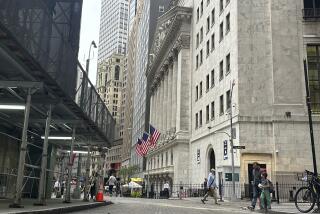Bond Yields Dive on CPI Data
- Share via
Treasury bond yields plunged to new generational lows on Friday after the government said its consumer price index declined in April -- raising more fears about deflation.
On Wall Street, some investors pulled away from stocks, but major indexes closed only modestly lower. The Dow industrial average slipped 34.17 points, or 0.4%, to 8,678.97, but still recorded its third straight weekly gain, rising 0.9%. Broader indexes were up for a fifth week.
A sharp drop in energy costs pulled the consumer price index down 0.3% in April, the government said. Even without energy costs, prices were flat -- another indication that companies are having trouble raising prices, which may lead to a broader deflationary trend in the economy, some analysts said.
The Federal Reserve warned on May 6 that it was concerned about deflation. Its warning was viewed as a sign that policymakers may soon cut short-term interest rates again.
With Friday’s report, more investors and traders rushed to lock in bond yields, betting that the Fed will reduce rates.
“The market is on a flat-out tear,” said Chris Rupkey, financial economist at Bank of Tokyo/ Mitsubishi. “The rallying cry is deflation. If inflation was the scourge of the bond market in years past, deflation makes bonds much more valuable and people are buying like there’s no tomorrow.”
As investors poured in, the yield on the 10-year Treasury note, a benchmark for mortgage rates, slid to a 45-year low of 3.42% from 3.53% on Thursday. Just two weeks ago the yield was at 3.93%.
The two-year T-note yield dropped to 1.31% from 1.44% on Thursday.
A separate report Friday revealed that the once-robust housing market cooled during April. U.S. housing starts fell a surprising 6.8% that month.
Still, a renewed drop in mortgage rates could revitalize the housing market, analysts said.
For some stock investors, deflation jitters may have proved troubling on Friday by raising the specter of a downturn in corporate earnings. But most investors appeared to shrug off those concerns.
On the New York Stock Exchange rising stocks outnumbered losers by a narrow margin, though losers topped winners by about 8 to 7 on Nasdaq.
The Standard & Poor’s 500 index eased 2.37 points, or 0.3%, to 944.30, but it was up 1.2% for the week -- the fifth straight weekly gain. Despite deflation issues, most stock investors still appear convinced that the economy will improve in the second half of the year.
The Nasdaq composite lost 12.85 points, or 0.8%, to 1,538.53 on Friday, but rose 1.2% for the week, also the fifth straight weekly advance.
Among the market highlights:
* Dell Computer pressured Nasdaq, dropping 99 cents to $31.19 as investors expressed disappointment that its results and outlook did not exceed expectations. Analysts said the company must indicate faster growth to justify the recent rise in its stock to 2 1/2-year highs.
* Chip equipment makers such as Applied Materials, down 58 cents to $14.31, sagged after a trade group said Thursday that orders for chip production and testing equipment from North American manufacturers dropped in April.
* The weak economic reports took their toll on the dollar, which had its biggest drop against the euro in 10 months as investors speculated that ministers meeting at a Group of Seven economic summit this weekend wouldn’t take action to halt the greenback’s slide.
* Gold hit a 10-week high, gaining $2.10 to $354.70 an ounce in New York, as the dollar fell.
Market Roundup, C4-5
More to Read
Inside the business of entertainment
The Wide Shot brings you news, analysis and insights on everything from streaming wars to production — and what it all means for the future.
You may occasionally receive promotional content from the Los Angeles Times.










